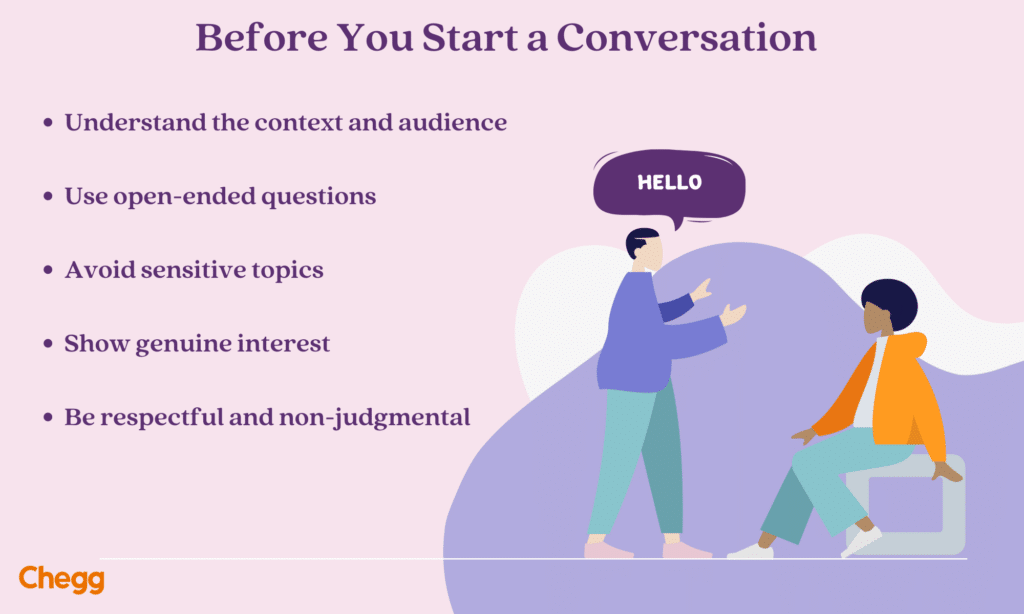Home » Career Guidance » How to Start a Conversation? – (15 Conversation Starters)
How to Start a Conversation? - (15 Conversation Starters)

Table of Contents
One of the most crucial life skills to develop is good communication. Communication is described as the conveyance of information to develop improved understanding. Leaders who understand how to start a conversation and successfully interact with others around them have increased efficiency and enhanced relationships in all aspects of their life.
Did you know that knowing how to listen carefully is essential for effective communication? As communication is also the capacity to have empathy, openness, and constructive comments depending on what you perceive.
You never know when a simple conversation might develop into an opportunity for you. To get started, you can make a list of conversation starters to help you speak with anyone.
So, here is all you need to know about how to initiate a conversation, with examples of formal and informal icebreakers for conversation.
Things to Know Before Initiating Conversation
Some individuals appear to have a natural ability to strike up a conversation, whereas others struggle in making small talk. Breaking the ice in conversation is a talent, but before you begin, you need to know a few things. Read on!

Understand the Context and Audience
The process of identifying an audience and approaching people for conversation based on their interests, degree of comprehension, attitudes, and beliefs is known as audience analysis.
You must think about your audience and context. Based on what your listener already understands, you must adapt the formality and intricacy of your language. Consider your audience’s multiple aspects, mainly:
- If they have something in common.
- Where they diverge
- What degree of expertise do they have to share on the subject
Although it is vital to adapt your messaging and methods of communication to your audience, this does not mean you can lose track of what you need people to know. While initiating conversation, ensure you combine them effectively and clearly throughout your communication.
Use Open-ended Questions
While attending an event such as a party or seminar, asking open-ended questions could spark essential conversations. Open-ended questions are useful because they encourage people to stop, ponder, and reflect. It includes personal sentiments, views, or ideas regarding a topic.
Queries demonstrate that you are engaged and paying attention. Just be sure to let the other person respond and lead the conversation.
Avoid Sensitive Topics
There are a few topics you should avoid unless you are really comfortable with the person you are chatting with. Anything rude, contentious, or uncomfortable should be avoided during a discussion. When deciding how to start a conversation with a stranger, it is advisable to go the safe route. This conversation starter is less frightening yet encourages the other person to respond.
Strive to begin the discussion in a positive tone. Keep your criticisms and unfavorable views to a minimum. Whatever the scenario, you can always find something nice to say. Individuals are more likely to react positively to favorable comments than negatively.
Show Genuine Interest
Ask a question about what the other person does, then concentrate on truly hearing what they have to say. People like talking about topics they are passionate about. This is why, showing genuine interest in what other people enjoy may be fantastic fuel for a terrific discussion.
- Maintain eye contact without staring or glaring.
- Wear a smile that communicates that you are friendly and interested.
Humans have a propensity to “fold up” when they are uneasy or threatened. Crossing your arms, legs, or ankles, shifting in your seat, putting your hands in your pockets, or even angling your body away from others are all examples of body language. So, what should you do while speaking to another person?
Well, Janine Driver, a body language expert, says in her best-selling book, You Say More Than You Think: “Our belly button’s orientation reflects our attitude and indicates our emotional condition. When we abruptly move our navel towards a door or exit, or away from someone, we unconsciously sign that we want out of the discourse, and maybe even out of the relationship.”
Be Respectful and Non-judgmental
Showing respect via communication is critical to creating connections, succeeding in your career, and improving your working environment. Respect in communication is vital — not only in terms of cultural practice but also in terms of common decency and creating relationships.
- Employ politeness, kindness, and courtesy.
- Listen with compassion.
- Avoid any negative comments.
- Be emotionally sensitive and consider other people’s perspectives.
Mastering nonjudgmental listening delivers many advantages while attempting to assist and comprehend people. They are as follows:
- Being able to completely comprehend people without being distracted or affected by our past experiences or subconscious thinking.
- Creating a secure setting in which a speaker is likely to feel comfortable enough to talk honestly.
- Allow the speaker to go through and comprehend their ideas and emotions about their circumstance in a safe atmosphere.
Now that you have read the tips for starting a conversation, it is time to know the best conversation starters in a professional setting. Here are 10 examples of it.
Also Read: Soft Skills Training and its Benefits

Conversation Starters for Formal Conversation
Understanding the correct conversation starters for various scenarios might help you develop rapport with peers and other professionals to generate new connections and long-term partnerships. Here is how to start the conversation in a formal setting –
- Ask for information. For example, if you run into a colleague at a conference with whom you are yet to talk, you can ask them when the chief guest would be speaking.
- Introduce yourself. Sometimes greeting the other person and introducing yourself is the best way to start a discussion. ‘Hello, my name is Emma,’ for example. I began work on Monday and just wanted to say hello.’
- Begin with a compliment, such as, “You did a wonderful job on the Mumbai assignment.”
- Asking for assistance goes a long way toward creating a professional connection with another individual. For example, do you know where I might receive a schedule?
- Earning someone’s trust and respect by providing them with assistance is one of the finest methods to lay the groundwork for dialogue.
- Demonstrate an interest in learning more about the individual professionally. For example, you might ask, “How long have you been working at this company, or what is your experience working here?
- You can also use informal questions for breaking the ice in conversation, such as How is your day at work today?
- Start a discussion around a shared characteristic. This is an excellent method to begin a meaningful conversation. Example: “I saw you eat with your left hand, yet you write with your right hand. I do the same thing.”
- Your desktop wallpaper depicts a sweet and innocent youngster. “What is your child’s age?”
- What aspect of your job provides you with the greatest joy?
Every conversation starts with a body. Now that you are familiar with formal conversation starters, here are some engaging questions for conversation in an informal setting.
Also Read: Top Communication Skills you need to Master Right Now
Starting a Conversation in an Informal Setting
What factors contribute to an effective conversation starter? Although there is no perfect formula, you can adapt your inquiries to specific scenarios. For example, the conversation openers you use with your friends will vary from those you use with your employer (at parties or social events).
Here are 5 ideas of how to start the conversation in an informal setting.
- Discuss what you’ve recently loved and what’s on your to-do list. For example, what do you think is the finest Netflix program right now?
- Talk about your surroundings. Are you at a lovely hotel, residence, or conference venue? Is the town notable? Have you lately visited a nice neighboring location?
- How’s that drink/appetizer/artwork/game going?
- Have you been working on anything interesting recently?
- Food is a great subject for a small chat since practically everyone enjoys eating. Inquire about the places they suggest and what items you should eat.
Making Valuable and Impactful conversation
Talking to people is a crucial part of our everyday life. It all comes down to interacting, sharing ideas and opinions, and listening to one another. The most challenging thing, however, is breaking the ice in conversation.
If you understand the ideas for beginning a discussion and how to start the conversation in both professional and casual settings, you will have the foundation to generate productive conversations.
And for more career tips and useful information view our blogs on Life Skills.
Frequently Asked Questions
Effective communication is crucial for fostering strong and meaningful friendships. By sharing thoughts and concerns with each other, friends can strengthen their connection and work through any problems that may arise.
Open-ended questions do not have a simple ‘yes’ or ‘no’ response and instead urge individuals to expound on their arguments. Open-ended inquiries allow you to see things from the other person’s point of view as you learn about their perspectives on many topics.
You can make small talk by asking open-ended questions and listening actively. You can show interest in the person’s life by learning more about their work or some valuable knowledge they can share with you or vice-versa.
To begin with, you can ask a question or give a compliment about something. Body language is important in the beginning and throughout the conversation. Make them feel you are approachable and friendly.
Related Read:
To read more related articles, click here.
Got a question on this topic?